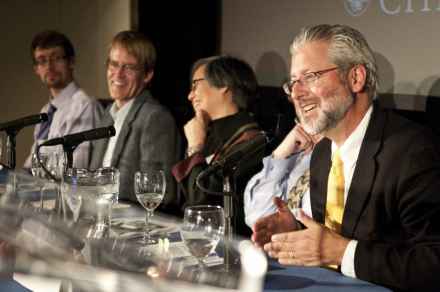Patrick Jagoda Discusses Time Travel, Video Games During Interdisciplinary Panel
On November 7 at the Field Museum, a multidisciplinary panel composed of University of Chicago faculty together with Argonne National Laboratory and Fermi National Accelerator Laboratory researchers and engineers convened to discuss the topic of time. “Playing with Time” was the sixth in a Joint Speaker Event series organized by the Office of the Vice President for Research and for National Laboratories. Questions discussed by the panel included, “Did humans invent time to help explain everything around us? Was there time before the origin of the universe?” and “How does a virus experience time?”
Patrick Jagoda, Assistant Professor of English, noted the ways humanities fields like literature and new media grapple with the notion of time, such as in the novel Einstein’s Dreams. “Clock time makes ordered schedules possible, but bodily time is shaped by moods, desires and whims,” he said. “Another scheme imagines time as a current of water occasionally displaced by passing breezes.” Video games, he noted, have developed ways to allow users to manipulate time.
The question of time travel fascinated the panel. Joseph Lykken, a particle theorist at Fermilab, explained that travel to the future has been observed with particle accelerators. “Muons (subatomic particles), for example, usually survive for a microsecond, but when we speed them up they can survive a thousand times as long. They have traveled to the future.” For the humanities, time travel may involve fewer subatomic particles and more creativity. Jagoda noted that reading an old book or playing a video game can be an imaginative way to put oneself in another time.
